

Coventry City of Culture Trust has received a significant grant to support its apprenticeship programme, a major part of the skills legacy that Coventry UK City of 2021 will leave behind.
The Cadent Foundation awarded the Trust £20,000 to fund its Production Apprentice – one of 14 young people who have been given the opportunity to be part of the Coventry 2021 team to deliver UK City of Culture.
The Trust’s apprentices have been in post since November 2020 as part of a structured Level Three apprenticeship course. They are working across the Trust’s departments and learning from leading industry professionals, as part of the team delivering the year.
They are also benefitting from a programme of mentoring, pastoral care and employability skills development, delivered in partnership with training provider North Warwickshire and South Leicester College.
Martin Sutherland, Chief Executive of Coventry City of Culture Trust, said: “We are delighted to have received this support from the Cadent Foundation.
“Our apprenticeship programme is offering an amazing opportunity for our 14 young people, who are learning a range of new skills and gaining invaluable experience, and can now say that they are part of the team delivering UK City of Culture.
“We are extremely grateful to the Cadent Foundation for supporting our Production Apprentice and helping to make sure that our programme could be as comprehensive as possible.”
Julia Dwyer, Director of the Cadent Foundation said: “We are thrilled to be able to support Coventry City of Culture Trust by funding one of the apprentices helping to deliver the UK City of Culture initiative. This is such an important and historic event for our home city and we are excited to play our part in bringing it to life.
“Apprenticeships play a vital role in educating, inspiring and equipping young people with the skills needed to achieve their full potential, which is something the Cadent Foundation is passionate about.”
The wider apprenticeship programme has been made possible through the support of the Trust’s core funders, including Coventry City Council, DCMS, Arts Council England and West Midlands Combined Authority.

Elevate EBP, a non profit organisation committed to transforming lives and creating growth in the City of Liverpool, has been awarded a £15,000 grant from the Cadent Foundation to help inspire young people by creating aspirational experiences with local businesses in the renewable energy sector.
The funding will be used to deliver ‘Meet the Professionals’, a programme of networking events that will enable students from 15 schools across Liverpool to speak with professionals working in low carbon and renewable energy fields. These interactive sessions aim to showcase the careers available in an exciting and positive light, with students able to explore the different roles and pathways available, including apprenticeships and graduate programmes.
Sessions will be delivered virtually, with professionals taking part in webinars that are streamed live into the classroom. After a short presentation about their career journey, sector and advice for the future; students will be given the opportunity to interview the professionals with a Q&A session.
The events will provide students with a better understanding and raised awareness of the future opportunities and different pathways that are accessible to them, especially within the Liverpool area. They will also help to support local schools and colleges to deliver their Careers Strategy.
Gill Ditchburn, Chief Executive Officer at Elevate EBP said: “In 2019, The Liverpool City Region Combined Authority, declared a climate emergency and set an ambitious target for the city region to be Net Zero Carbon by 2040. Achieving this goal will require big changes to various aspects of life; from how we get around, to how we heat our homes. Lots of changes will happen between now and 2040 and this will lead to a huge increase in demand for the skills needed to support this growing sector.”
“We are incredibly grateful to the Cadent Foundation for this funding which is going to help us bridge the gap between schools, colleges and businesses and nurture the talents of the young people in our city to not only create but become the positive change needed for the future.”
Julia Dwyer, Director of the Cadent Foundation said: “We are delighted to be able to support Elevate EBP with this exciting project. As we strive to meet ambitious net zero targets and create a greener society, we need to ensure we have the skills sets and the workforce needed to build a strong and sustainable future.
“Through ‘Meet the Professionals’ young people will have the opportunity to develop their knowledge, gain valuable insights into careers offered by the green economy and be better equipped to access opportunities to become the next generation of scientists and engineers.”
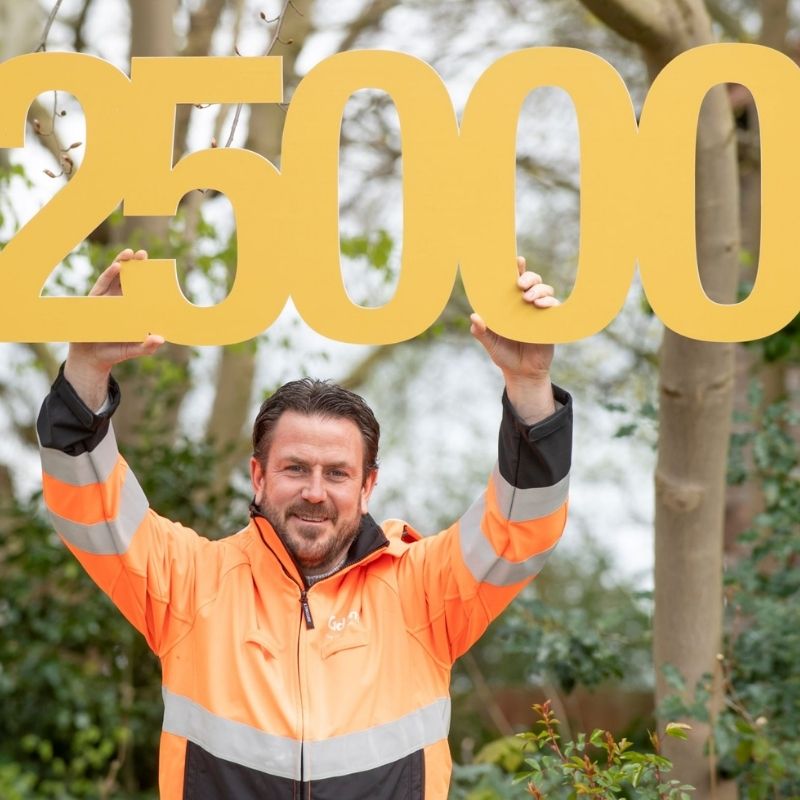
Twelve North West charities have received a share of a £25,000 grant fund from the Cadent Foundation, after being nominated and voted for by Cadent employees and customers across the region.
In the second round of our ‘Connecting Colleagues, Customers and Communities’ initiative, Cadent employees in the North West nominated local charities which were then shortlisted and put forward to a public vote. More than 1500 customers took part in the voting process with the winning charity in each county being awarded the top grant of £3000 and the runners up each receiving either £2000 or £1000.
Rainbow Hub in Mawdesley, nr Ormskirk, Love, Jasmine in Liverpool, Barrow Foodbank in Barrow-in-Furness, BIG in Mental Health in Bury and Blythe House Hospicecare in High Peak, each received the highest number of votes in each county. (See table below for full list of charities).
Rainbow Hub supports children with physical and neurological disabilities through a range of therapies including conductive education, physio, rebound therapy and communication services. Chief Executive, Lyndsay Fahey, said: “This is wonderful news and we cannot thank Paul who nominated us and everyone who voted enough for this fantastic grant. The services we provide are so important to the children we support and their families. Every penny helps us continue to provide the therapies that help each individual reach their potential. As we do not receive any statutory funding, we rely on grants and monies that we raise ourselves.”
Love, Jasmine provides support to families following the death of a child of any age, including adult children. They provide emotional support, practical support and promote self-care to improve the emotional wellbeing of the whole family. Co-Founder, Rob Lapsley said: “We were delighted to have been nominated in the first place but to then find out that we received the most votes was amazing. We’d like to express our sincere gratitude to the employee who originally nominated us and to everyone that voted for us. The grant will be used to support our wellbeing activities for bereaved families as they seek to develop coping strategies after the loss of their child.”
BIG, also known as Bury Involvement Group is a charity run by, and for, people with personal experiences of mental and emotional distress and extreme states. It offers a number of peer support services including free support groups, telephone support, and an out of hour’s crisis service. Jordan Fahy, Chief Officer at BIG, said: “Receiving this donation is incredibly humbling. It makes a massive difference to us just knowing Cadent employees and customers want to support the work we do. As a small local charity raising the funds we need to meet the demand for our services has always been a real challenge and this has only got more difficult in recent times. This donation means we can continue to act as a lifeline providing free mental health support to people who are really struggling to get through each day in our community. From everyone at BIG we really can’t thank you all enough.”
Julia Dwyer, Director of the Cadent Foundation, said: “The ‘Connecting Colleagues, Customers and Communities’ initiative has been a fantastic success. Since it was first launched last year, £50,000 has been distributed to 26 charities across the North West which is testament to the commitment and support from colleagues in the region. It has allowed Cadent customers and colleagues to make a real difference in their local community by nominating and voting for charities which are close to their hearts.
“We’ve seen first-hand what a huge difference this funding can make to local charities, especially after the last 18 months. Charities like these play a vital role in in our society and we’re delighted to be able to offer our support to help them continue their great work.”
Full list of charities who have received a grant:
| Charity | Location | Grant |
| Rainbow Hub | Mawdesley, Nr Ormskirk | £3000 |
| The Civic Arts Centre and Theatre | Oswaldtwistle | £2000 |
| Love, Jasmine | Liverpool | £3000 |
| Claire House Children’s Hospice | Liverpool | £1000 |
| The Walton Centre | Liverpool | £1000 |
| BIG in Mental Health | Bury | £3000 |
| Sharks Community Trust | Sale | £1000 |
| Willow Wood Hospice | Ashton-Under-Lyne | £1000 |
| Barrow Foodbank | Barrow-in-Furness | £3000 |
| Ambleside Action for a Future | Ambleside | £2000 |
| Blythe House Hospicecare | High Peak | £3000 |
| Barrowmore | Chester | £2000 |
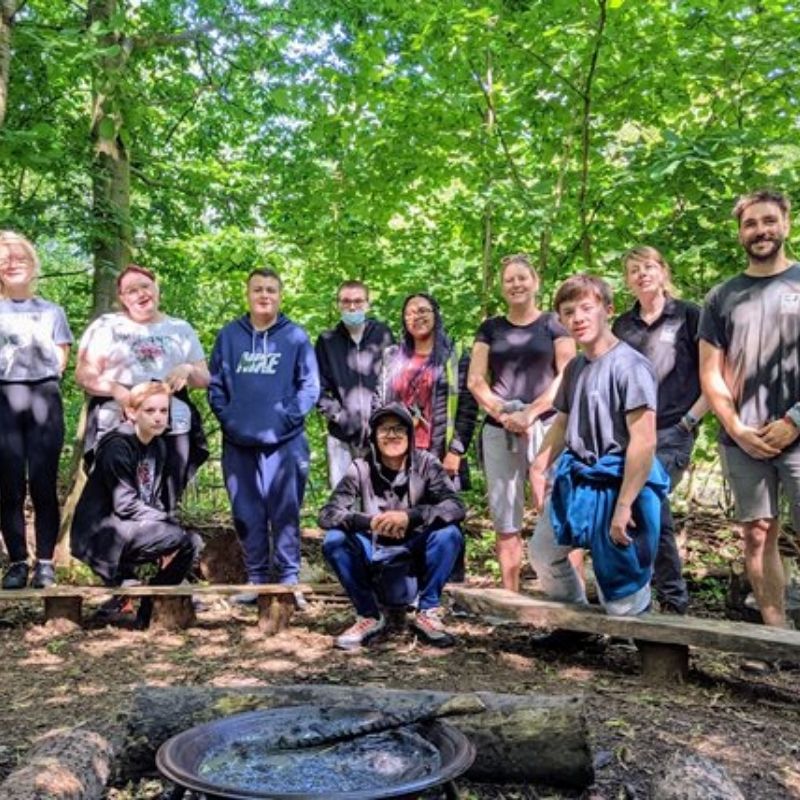
Eleven pioneering students from Selly Oak Trust School, a college for children with special educational needs, have become the first to achieve their Level 1 qualifications in Tool Use with The Wildlife Trust for Birmingham and the Black Country.
Throughout the last term, these young people, aged 15-18, have been helping to look after the Centre of the Earth, an urban nature reserve in central Birmingham, thanks to the ‘Natural Connections’ programme, funded by the Cadent Foundation.
Through hands-on conservation activities and weekly volunteering, the students have gained practical skills to manage local habitats, learned how to be mindful in nature and discovered how to build a daily connection with nature. Along the way, they have learned how to use tools such as loppers, forks, bowsaws and bill hooks, whilst helping to care for the woodland, meadow and pond habitats on the site.
“After taking part in this course, I realised that I really like doing this kind of work – and this is the kind of job I want to do in the future.” – Natural Connections Student
The Natural Connections programme has been funded by a £36,300 grant from the Cadent Foundation as part of a two-year partnership with The Wildlife Trust. The programme offers accredited conservation training programmes, supported volunteering and a series of eight-week Health and Wellbeing in Nature courses.
Gareth Morgan, Head of Education and Engagement at The Wildlife Trust for Birmingham and the Black Country said: “The students of Selly Oak Trust School have worked really hard to look after our nature reserve and fully deserve their Tool Use qualifications. As well as being lots of fun, these courses are brilliant ways to learn important practical skills and can be valuable stepping-stones to future careers conservation sector. Thanks to Cadent Foundation for helping us nurture the next generation of wildlife enthusiasts!”
Julia Dwyer, Cadent Foundation Director, added: “We are delighted that the funding from the Cadent Foundation is enabling The Wildlife Trust for Birmingham and Black Country to expand its vital work alongside communities to help people develop new skills, build relationships and play an important role in shaping their local wild places.”

Four schools have taken part in the pilot phase of a new after-school project to help young people reach their full potential in STEM subjects (Science, Technology, Engineering and Maths).
Tile Cross Academy in Birmingham, Stoke Park Secondary School in Coventry, George Greens Secondary School in Tower Hamlets and Sebright Primary School in Hackney were the first schools to offer CASE Clubs (Cadent Foundation After-School Science & Engineering) run by education and youth charity, City Year UK. Funded by a £100,000 grant from the Cadent Foundation, the clubs are designed to bring STEM to life in a way that is accessible and exciting. Over the course of six weeks, students have engaged in various hands on activities such as building rockets and launchers as a way of using problem-solving-based learning to explore key engineering themes.
As well as helping to improve academic performance, the clubs also help children develop essential life skills such as problem solving, self-confidence, positive decision-making, teamwork and communication. The sessions are run by near-peer volunteer mentors (18-25 years) and employees from Cadent Gas have also supported the mentors as STEM role models to help bring to life careers in engineering. Each student who took part in the six-week project has received a British Science Association CREST Award, a nationally recognised scheme for student-led projects in STEM subjects.

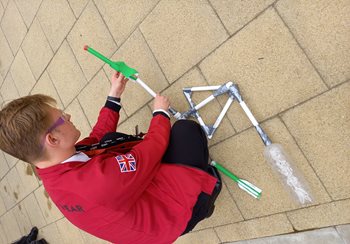
The students clearly enjoyed the experience and had lots of positive comments about the projects:
“I enjoyed the STEM Club because it was fun. I liked making my own rocket. The sessions were funny and creative. I had a good time launching it and seeing how far it goes.” Year 7 pupil, Tile Cross Academy, Birmingham
"We asked if we could come to the club, friends had told us about it ....I don't normally like science but this was good." Year 7 pupil, Stoke Park Secondary School, Coventry
“It is so great having a STEM after school club, that I can go to with my friends and get to create different things. It's so much fun getting to build stuff on my own.” Year 7 pupil, George Greens Secondary School, Tower Hamlets.
Jennifer Roberts, Assistant Head Teacher at Sebright Primary School said: “The pupils at Sebright greatly enjoyed the STEM club offered by Cadent and led by City Year volunteers at the school. Pupils were very enthusiastic and engaged at having the opportunity to deepen their science knowledge in such a hands-on way. Thank you!"
Laura Meyrick, Director of Year 7 at Stoke Park said: “It has been such a phenomenal experience watching our young students grow during this STEM club. Our learners have grown in confidence, indulged in Science and have become leaders of their learning.”
The CASE Clubs will be rolled out in 15 schools across the West Midlands, North West and North London later in the year.
Kevin Munday, Chief Executive at City Year UK said: “We’re extremely grateful to the Cadent Foundation for this funding which is helping us to tackle educational inequality and engage more children in creative STEM learning activities. Around 30% of children are growing up in poverty in the UK and too often, their prospects are linked to how much their family earns. By age 11, less than half of pupils entitled to free school meals reach the standards expected in reading, writing and maths. Children who participate in extracurricular activities perform better in school, build confidence and gain social skills, however children from deprived communities are three times less likely to participate in extracurricular activities compared to their wealthier peers.”
Julia Dwyer, Director of the Cadent Foundation, explains why it is important to invest in STEM education: “We are delighted to be able to support City Year with this exciting new project. As technologies continue to develop and create innovative job opportunities, we need to prepare to meet those needs. By investing in STEM education and exposing students to hands-on STEM experiences we will ensure that they have the skill sets needed to build the strong and sustainable communities of the future.
“Through the CASE Clubs young people will have the opportunity to develop their skills and knowledge, gain valuable insights into STEM careers and be better equipped to access opportunities to become the next generation of scientists, computer programmers, technicians and engineers.”
For more information about City Year UK, including how you can apply to become a volunteer mentor or if you want to know more about how your school can get involved, visit www.cityyear.org.uk

Year 9 students at West Walsall E-ACT Academy in Walsall, wowed judges with their vision and creativity as part of a new project which aims to empower young people to use STEM (Science, Technology, Engineering and Maths) skills to develop solutions for environmental challenges.
The students were one of 18 teams across the country who took part in the STEM projects run by education charity, Engineering Development Trust (EDT) and funded by the Cadent Foundation. Each of the projects were designed to tackle key issues such as waste management and recycling, energy use and designing buildings for climate change.
An online graduation event was held as a celebration of all student’s achievements in the projects with awards presented for teamwork, determination and innovation. West Walsall E-ACT Academy’ s project, ‘My School is an Island’ was awarded the Environmental Award. Judges were impressed with the team’s extensive research and consideration of energy sources, agriculture methods and waste management to create a self-sufficient and sustainable island. Their project demonstrated great technical and creative skills, with team leader Romairo Stone creating a website for the island school.
Everyone who graduated received an Industrial Cadets Bronze Award, a national young persons’ recognition and employability award, supported by its patron, HRH The Prince of Wales.
Soma Choudhury, Teacher of Mathematics at West Walsall E-ACT Academy said: “It has been an absolute pleasure to see students working together to the best of their ability to reach their goal. It seems this opportunity has awakened their inner creativity and enhanced their problem-solving capacity, this allowed them to explore different pathways within STEM and made them independent thinkers who are willing to take initiative of their own learning. I truly believe that we have some future engineers and scientists in the making.”
Student, Ziyue He added: “My confidence has definitely increased since the start when I was just simply a quiet girl who sat on the sides. However, with the support of this team, our teacher and mentor, I have started to recognise the significance of teamwork and not just independent work all the time. Being able to participate in this club, I have experienced several life skills such as creative and critical thinking, problem solving and taking on challenges.”
Julie Feest, CEO of EDT commented: “In a year when young people have faced multiple activity cancellations the opportunity to work on an environmental project supported by mentoring from STEM professionals was a much needed and positive experience for young people. As well as developing their knowledge of STEM, the students achieved an Industrial Cadets Bronze Award and developed key life and employability skills such as teamwork, communication, problem solving, project management, innovation, ICT and numeracy skills.”

Education and youth charity, City Year UK, has been awarded a £100,000 grant from the Cadent Foundation to help disadvantaged young people reach their full potential in STEM subjects (Science, Technology, Engineering and Maths) through a programme of fun, hands on after-school activities.
The funding will be used to deliver CASE Clubs (Cadent Foundation After-School Science & Engineering) in schools across North London, West Midlands and the North West. By experimenting through engineering, the CASE Clubs will bring STEM to life in a way that is accessible and exciting. Activities will be largely pupil-led and use problem-solving-based learning to explore themes such as sustainability, carbon neutrality and climate change.
Over the course of a year, CASE Clubs will provide vulnerable children with the support and learning to help them achieve curriculum attainment levels in those critical transitional years between primary and secondary school. As well as improving academic performance, the clubs will help children develop essential life skills such as problem solving, self-confidence, positive decision-making, teamwork and communication.
The sessions are run by near-peer volunteer mentors (18-25 years) and employees from Cadent Gas will also support the mentors as STEM role models to help bring to life careers in engineering. At the end, each student will gain a British Science Association CREST Award, a nationally recognised scheme for student-led projects in STEM subjects.
Kevin Munday, Chief Executive at City Year UK said: “We’re extremely grateful to the Cadent Foundation for this funding which is going to help us tackle educational inequality and engage more children in creative STEM learning activities. Around 30% of children are growing up in poverty in the UK and too often, their prospects are linked to how much their family earns. By age 11, less than half of pupils entitled to free school meals reach the standards expected in reading, writing and maths. Children who participate in extracurricular activities perform better in school, build confidence and gain social skills, however children from deprived communities are three times less likely to participate in extracurricular activities compared to their wealthier peers.
“Our year-long programme enables inspirational young people to volunteer full-time in schools in some of our most disadvantaged communities. Our mentors not only acquire real-world experience working in schools as well as valuable personal and professional skills through provided training, but they coach and inspire pupils and give much needed extra help to those who need it the most. We see that by helping pupils realise their potential, our volunteer mentors also unlock their own.”
Julia Dwyer, Director of the Cadent Foundation, explains why it is important to invest in STEM education: “We are delighted to be able to support City Year with this exciting new project. As technologies continue to develop and create innovative job opportunities, we need to prepare to meet those needs. By investing in STEM education and exposing students to hands-on STEM experiences we will ensure that they have the skill sets needed to build the strong and sustainable communities of the future.
“Through the CASE Clubs young people will have the opportunity to develop their skills and knowledge, gain valuable insights into STEM careers and be better equipped to access opportunities to become the next generation of scientists, computer programmers, technicians and engineers.”
For more information about City Year UK, including how you can apply to become a volunteer mentor or if you want to know more about how your school can get involved,visitwww.cityyear.org.uk

Education charity, Engineering Development Trust (EDT) has been awarded a £50,000 grant from the Cadent Foundation to educate young people on the importance of STEM (Science, Technology, Engineering and Maths) in solving environmental challenges and empower them to use their skills to develop solutions.
Over the next two years, the funding will be used to deliver Industrial Cadets Bronze projects with Year 8 and 9 pupils in schools across the North West, West Midlands, North London and Eastern region; predominantly in areas with above average levels of deprivation and youth unemployment. With support from a mentor, the pupils will use fun and educational activities to develop environmental solutions to key issues such as waste management and recycling, energy use and designing buildings for climate change. The programme will showcase the career pathways available including apprenticeships and graduate opportunities, and employees from Cadent Gas will also support as STEM role models to bring to life careers in the energy sector.
The projects will enable students to develop key life and employability skills such as teamwork, communication, problem solving, project management, innovation, ICT and numeracy skills. At the end, each student will gain an Industrial Cadets Bronze Award. Industrial Cadets is a national young persons’ recognition and employability award, supported by its patron, HRH The Prince of Wales.
Geoff Jellis, Fundraising Manager at Engineering Development Trust said: “We’re extremely grateful to the Cadent Foundation for the funding which is helping us to expand our Industrial Cadets Bronze programme and work with a wider and more diverse group of students.
“In a year when young people have faced multiple activity cancellations the opportunity to work on an environmental project supported by mentoring from STEM professionals is proving to be a much needed and positive experience for young people.”
Julia Dwyer, Director of the Cadent Foundation, explains why it is important to invest in STEM education: “With the growth of the green economy there is an urgent need to educate, inspire and equip young people with the environmental and STEM skill-sets needed to build the strong and sustainable communities of the future.
“We are delighted to be able to support Engineering Development Trust to expand its fantastic programmes across our networks. These projects will help young people gain valuable insights into STEM careers and ensure they are better equipped to access opportunities to become the next generation of STEM professionals.”
One of the first schools to take part in the programme is Conisborough College in London. Science Teacher, Eric Griffin, commented: “As a school and particularly as a science department, we are extremely grateful to have had the opportunity to be part of the bronze award collaboration. Such projects demonstrate how STEM subjects can be promoted within a school with the help and support of industrial partners.
“The pupils in my teams were particularly excited about having a real project to work on (as were their parents) and found the development of current skills and the discovery of new ones very rewarding, though challenging. After the assessment of their work, the glow that comes from achievements was very evident among them and, I too had a sense of pride in the students.”
For more information about Engineering Development Trust (EDT) and the range of programmes it offers, visit www.etrust.org.uk

A new project which will create pathways for wildlife and link favourite nature spots is being launched in North Manchester following a £70,256 grant from the Cadent Foundation.
The North Manchester Nature Network will give local people and communities the chance to protect wild animals and plants in the heart of the city. The Wildlife Trust for Lancashire, Manchester and North Merseyside and Manchester City Council are working together on the project, which will safeguard existing sites and encourage new wildlife into the city along green corridors.
The Nature Network project (part of the My Wild City team) will focus on a strip of four Sites of Biological Importance (SBIs) where nature thrives. Bailey’s Wood, Boggart’s Hole Clough, Broadhurst Clough and Moston Fairways are all within walking distance of thousands of local people. These sites are much loved and are incredibly important for city wildlife such as owls, frogs and butterflies.
The Nature Network project will be running family events, training days and volunteering taskforces over the next year. This will offer people the chance to come face to face with this wildlife while giving it a helping hand. Not only that, the project will help people attract this wildlife into their gardens. Nature can struggle to travel through the bricks, tarmac and concrete of a big city. Managing our open spaces like parks, community sites and gardens for wildlife can help animals move through our neighbourhoods and reach safety.
The Nature Network project is also about helping local communities in North Manchester by tackling poor mental health. Even before the pandemic, nature was increasingly recognised as an amazing tool that could be used to reduce stress, depression and anxiety. Having regular access to nature dramatically increases positive wellbeing and good mental health.
Russell Hedley is the My Wild City Project Officer for the new North Manchester Nature Network: "This is a really exciting opportunity for people to get involved with nature on their doorstep. Throughout the next twelve months we will be running regular nature events and volunteering days. These will be great opportunities to meet like-minded people, tackle isolation and loneliness and make a difference to our Manchester wildlife.
"If we all did one small thing to help nature, it would make a huge difference to Manchester’s wildlife. This benefits local nature and local people – win win! That’s what this project is all about. We hope that this can be applied to other areas of the city and even other cities in the future."
Julia Dwyer, Cadent Foundation Director, added: “Sadly, we live in one of the most nature-depleted countries in the world, which is why projects such as this which are working to help wildlife recover and ensure nature is part of our everyday lives are so important.
“We are delighted that the funding from the Cadent Foundation will enable the Wildlife Trust to expand its vital work alongside communities to reverse the decline of nature, whilst helping people develop new skills, build relationships and play an important role in shaping their local wild places.”

The Lancashire based, Recycling Lives Charity, has been awarded a £13,200 grant from the Cadent Foundation to improve access to digital support services for prison leavers and the homeless in the region.
In today’s online society, not being able to connect electronically with the outside world is one of the greatest barriers to successful independent living. The Rehabilitation Digital Inclusion project will provide every prison leaver or resident completing the charity’s homeless residential programme, with either a mobile phone or tablet so they can get connected. The funding will enable participants to stay in touch with family, conduct their own job searching and support them with gaining sustainable employment.
An estimated 150-175 people will benefit from the project over the next 12 months. Recycling Lives’ offender rehabilitation programme is already extremely successful with less than 5% of the programmes’ prison leavers reoffending and over 75% gaining employment within the first year of release. It’s hoped that the added independence that being connected will bring will have an even greater impact on the programme’s success, not just to the individuals involved but also to the wider society. One person not reoffending within 12 months of release saves the taxpayer over £70,000 on average.
Alasdair Jackson, chief executive of Recycling Lives Social Enterprise, said: "This donation has been a great help to the men and women we support, particularly at a time when staying connected digitally has been a lifeline for so many. Securing paid work and forming positive, supportive relationships are two of the strongest factors for reducing an ex-offender's risk of reoffending so equipping someone with a smart phone or tablet supports both these things. As well as giving people independence the donated devices also save participants from spending their savings, allowing them to invest in other essentials such as new clothes for a job interview or driving lessons.
"We're very grateful to Cadent Foundation for this donation which will make a lasting difference to people's lives and helps us to reduce reoffending rates significantly."
The devices are helping men and women to resettle on release from prison, allowing them to reconnect with friends and family and access job adverts, online training or support services. Here’s what some of the beneficiaries of the programme had to say:
“I would’ve been lost without the phone,” said Graham. “And it was one less thing to worry about as well.”
Andrew used his phone to reconnect with his family and access substance misuse support programmes.
Donna used her tablet to access an online college course, allowing her to start developing new skills and knowledge for a career she hopes to pursue in the future – “it made it much easier than trying to do it on a mobile phone,” she said.
For Karl, the phone ensured he was able to adhere to licence conditions, keeping in touch with his probation officer. He also used it to contact potential employers and is one of the 80% of Recycling Lives’ participants to secure work within a few weeks of release from prison.
Julia Dwyer, Director of the Cadent Foundation, said: “Ex-offenders often have complex needs and can be some of the most vulnerable and disadvantaged in society. The Rehabilitation Digital Inclusion project will help them to develop the skills they need to live independently and break down some of the barriers to their employment.
“By helping them to stay connected and engaged with family and employers, they’ll have the opportunity to get their lives back on track. This funding will not only benefit the individuals at a difficult time in their life, it will also strengthen communities and promote social inclusion.”
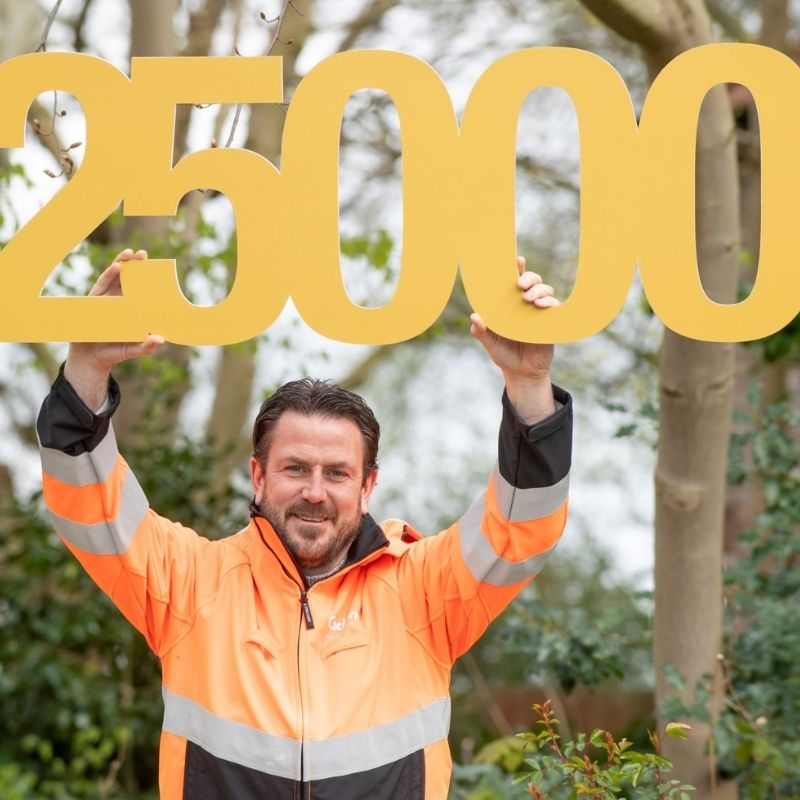
Fifteen charities across the North West have received a share of a £25,000 grant fund from the Cadent Foundation, after being nominated and voted for by Cadent employees and customers across the region.
Through the ‘Connecting Colleagues, Customers and Communities’ initiative, Cadent employees in the North West were asked to trial a new approach to the way in which local grants are allocated – by nominating local charities which were then shortlisted and put forward to a public vote. More than 1000 customers took part in the voting process with the winning charity in each county being awarded the top grant of £3000 and the runners up each receiving £1000.
Derian House Children’s Hospice in Chorley, Pure Insight in Stockport, Greenbank in Liverpool, MIND in Furness in Barrow and the Oasis Centre for Young People in Ellesmere Port received the highest number of votes in each county.
Derian House Children’s Hospice delivers end of life, palliative and neo-natal care to children and young people from Lancashire, South Cumbria and Greater Manchester. Caroline Taylor, Communications Manager, said: “We’re absolutely over the moon that the lovely lot at Cadent have chosen Derian House Children’s Hospice as one of their favourite charities to receive grant funding.
“It will mean the world to the seriously ill babies, children and young people we look after here at Derian to receive this money, especially as our donations have significantly declined due to the coronavirus pandemic, with the forced cancellation of events and temporary closure of our charity shops. £3,000 could pay for three families to have a free week’s holiday to make happy memories together, or it could pay for a hospice nurse for a month.”
Greenbank was set up to enhance the opportunities and status of people with disabilities through education, training, employment and recreation. Mark Palmer, Sport Development Manager at Greenbank Sports Academy, commented: “We’re so pleased to have been awarded £3000 by the Cadent Foundation. The funding will go towards vital refurbishment work including changing rooms and shower areas. Many of our service users are disabled with underlying health issues so these developments will go towards enabling an improved environment which will be vital in improving their confidence to return to activity. A big thank you to Cadent and all the customers who voted for us.”
Julia Dwyer, Director of the Cadent Foundation, said: “Over the last 12 months, the need to come together and support each other has never been more important. We wanted to ensure Cadent customers and colleagues were given the chance to help care for their local community by nominating and voting for charities which were close to their hearts.
“The ‘Connecting Colleagues, Customers and Communities’ initiative has been a huge success with 15 charities shortlisted and more than 1000 customers taking part in the voting process. The project has grown from strength to strength as a direct result of the ongoing focus, commitment and support from colleagues across the North West. It has allowed us to focus on where help is needed the most and offer grants to projects where we can make a real difference.”
Cadent engineer Michael Nutt from Liverpool collected the most customer votes. He added: “It’s difficult to pick one stand out comment from a customer because all the comments have been so positive. Customers like that these charities were selected by local Cadent staff and that voting is for the community by the community, particularly at a time when due to COVID, most charities are struggling to raise funds.”
Full list of charities who have received a grant:
| Charity | Location | Grant |
| Derian House Children’s Hospice | Chorley | £3000 |
| St John’s Hospice | Lancaster | £1000 |
| Action for ASD | Burnley | £1000 |
| Greenbank | Liverpool | £3000 |
| The Whitechapel Centre | Liverpool | £1000 |
| Merseyside and Cheshire Blood Bikes | Liverpool | £1000 |
| Pure Insight | Stockport | £2000 |
| Tree of Life Centre | Wythenshawe | £1000 |
| Jolly Josh | Rochdale | £1000 |
| Salford Deaf Children’s Society | Salford | £1000 |
| MIND in Furness | Barrow-in-Furness | £3000 |
| Dazzle for Children | Barrow-in-Furness | £2000 |
| Oasis Centre for Young People | Ellesmere Port | £3000 |
| Halton Haven Hospice | Runcorn | £1000 |
| Steve Prescott Foundation | Warrington | £1000 |

Middleport Matters Community Trust has been awarded a £24,670 grant from the Cadent Foundation to support a new project which aims to help households address climate change challenges by adopting a lifestyle approach to improving their environmental impact.
The Eco Lifestyle Project will undertake a range of renovations on a minimum of two properties In Middleport which are designed to improve their ecological footprint. This will include measures such as additional wall and loft insulation, greywater systems to reduce water use, installation of energy efficient lighting and heating, recycling and composting facilities and improved garden design to increase at home food production. .
Alongside the improvements on the properties, the charity will work with the tenants to improve their environmental awareness and develop an ecological footprint analysis which explores how typical life choices such as use of transport, shopping habits and leisure activities can reduce the overall environmental impact of the household.
Vicki Gwynne, Operations Manager at Middleport Matters Community Trust explains the reasons behind the project. “Whilst a considerable number of physical energy efficiency measures have been installed in some homes in the area over recent years, there is still a high prevalence of fuel poverty in Middleport and only a small amount of renewable energy is being generated locally. A recent study by Middleport Matters suggested that based on a limited range of insulation and heating measures, local residents have the potential to collectively save more than £80,000 per year on their energy bills. This would also result in a saving of more than 330,000kg of CO₂ and, if work was carried out by local installers, result in a benefit to the area of more than £13million.
“The Eco Lifestyle Project aims to demonstrate how we can address climate change challenges, tackle fuel poverty and achieve significant potential savings by adopting a lifestyle approach. By introducing practical and affordable housing renovations and supporting tenants to explore how information about the environmental impact of items and lifestyle choices can be used to reduce their overall ecological footprint, we hope to create a blueprint for a more sustainable community.”
As well as directly benefiting the tenants involved, the project will also look to engage the wider community through social media and the delivery of awareness sessions. The sessions will provide information and resources around topics such as energy efficiency, reducing your carbon footprint and making environmental improvements to suit your budget.
Vicki added: “Findings from this project will be used to improve environmental awareness and inspire other homeowners, landlords and tenants, both in Middleport and across the region, to reduce their ecological footprint. By doing so we hope to create a community that is strong, sustainable and resilient in the face of climate change.”
Julia Dwyer, Director of the Cadent Foundation, said: “One of the core objectives of the Cadent Foundation is to ensure that no one if left behind in the drive to a greener, more sustainable energy future. Initiatives like the Eco Lifestyle Project have a huge part to play in engaging everyone in the transition to net zero and the fight against Climate Change.
“We’re excited to support Middleport Matters Community Trust with this innovative new project. Not only will it provide practical solutions to alleviating fuel poverty in the region, it will also contribute to the preservation of the environment overall.”
For Karl, the phone ensured he was able to adhere to licence conditions, keeping in touch with his probation officer. He also used it to contact potential employers and is one of the 80% of Recycling Lives’ participants to secure work within a few weeks of release from prison.
Middleport Matters Community Trust is a community group dedicated to ensuring Middleport is a safe, thriving and welcoming place for everyone. It works to improve the local environment and empower residents to create positive change. For more information on the services offered, visit www.middleportmatters.co.uk

Signal Film & Media, a digital arts charity based in Barrow-in-Furness has been awarded a £24,664 grant from the Cadent Foundation to launch ‘Into Digital’, a creative media project which will use digital technologies to support people in the region to reconnect and learn new skills.
The funding will be used to create a stimulating programme of film, media and arts workshops that will equip people with digital skills and increase their employability, helping Cumbrian communities to thrive.
The charity will provide ongoing digital, IT and creative workshops for isolated adults, helping them to access the tech they need, increase their confidence and future prospects. Through the programme, 20 people will also gain an in-house IT certificate of learning – equipping them with employability skills and improved life chances.
Over the next 12 months, Into Digital will pilot six new intensive creative digital media projects. One such project, due to start this Spring is ‘West Coast Photo’, celebrating the richly diverse, often overlooked, county of Cumbria, through photography. West Coast Photo will be the first international photography festival to take place in Cumbria. It will reveal and celebrate this hidden area through the work of leading international, national and local artists. The project will involve schools, community groups, budding local artists, and Cumbrians more widely, in photography and digital visual media. It will provide opportunities for people who would not usually have the opportunity, to engage with, and be inspired by, exceptional contemporary artwork whilst improving their skills.
Loren Slater, Co-Director of Signal Film & Media said: “We are delighted to have received a grant from the Cadent Foundation. Their funding will help us support hundreds of people from Barrow and Cumbria to enjoy creative digital media experiences, learn new skills and celebrate the rich heritage and culture of our area. In the shadow of Covid-19, it’s more important than ever that people can come together, have something positive to celebrate and learn new digital skills to help them reconnect and get back on their feet. That’s exactly what we hope to do with this project, and we have some exciting workshops and activities lined up this year for local people to enjoy.
“We’re extremely grateful to the Cadent Foundation for supporting us with this grant. Not only will it directly support hundreds of people in our community, we hope that it will also help embed creative digital skills in Barrow and leave a lasting, sustainable legacy.”
Julia Dwyer, Director of the Cadent Foundation, said: “We’re delighted to support Signal Film & Media with this exciting initiative. The creative digital training and mentoring offered by Into Digital represents a real opportunity to break the cycle of isolation and deprivation in Barrow, helping people to recognise their own potential and to imagine broader horizons and brighter futures.”
Signal Film & Media is an award-winning charity providing a wide range of creative film and digital media engagement projects. It provides a unique resource for thousands of people of all ages and backgrounds to access free facilities, professional tutoring and hands-on experience in film and creative digital media. For more information, visit www.signalfilmandmedia.com
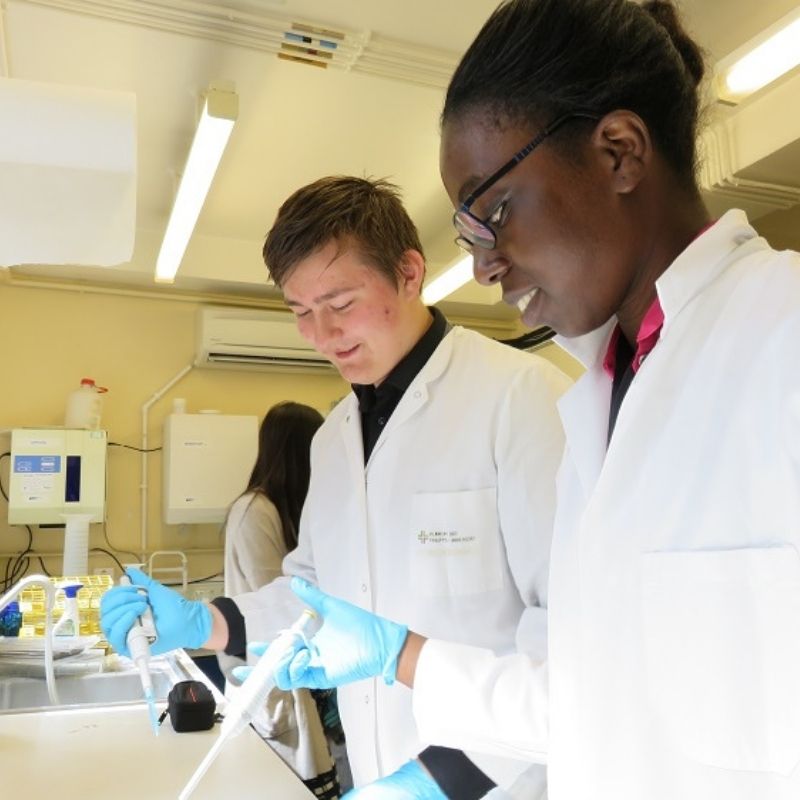
In2ScienceUK, a social mobility charity which helps young people from low-income and disadvantaged backgrounds gain practical insight into careers in science, technology, engineer and maths (STEM); has been awarded a £96,745 grant from the Cadent Foundation to expand its programme across North London, East of England and the North West.
Young people from disadvantaged backgrounds face significant barriers to their progression in STEM degrees and careers. In fact, only 10% of life science professionals, 15% of academics and 6% of doctors come from low socio-economic groups. In2scienceUK leverages the passion of STEM experts and engineering professionals to support young people to achieve their potential through life-changing work-placements, skills days and workshops. The In2scienceUK Programme has a significantly positive impact with independent evaluation proving that 58% of young people taking part progress to top tier universities. Nationally, just 11% of disadvantaged students progress to top universities. In 2020, In2scienceUK transformed its programme to be delivered online through a high-quality virtual STEM learning portal, this year the charity is determined to support more young people to reach their potential.
The new funding will support 160 young people who will become the first Cadent Foundation Scholars to participate in an innovative three step programme that includes:
Rebecca McKelvey, Founder and CEO of In2scienceUK said: “Poverty and social background are huge barriers to progressing to careers within STEM. If students don’t receive the right guidance and support through their schools and personal networks, they may never consider pursuing a career within this sector. By giving students from disadvantaged backgrounds high-quality opportunities and support at the start of their career journey, In2scienceUK empowers them to achieve their potential and become the next generation of researchers, innovators and pioneers.
“Our mission, to increase diversity and equal opportunity in STEM, has never been so relevant as it is today. COVID-19 has only highlighted and added to the disparity of opportunity between young people from disadvantaged backgrounds and those who are more affluent. Now, more than ever, we must encourage all young people to achieve their potential in STEM, regardless of their background.
“In 2020 we received 3000 applications from young people across the UK with great potential but in desperate need of support to help secure a brighter future. The need is huge. We are extremely grateful to the Cadent Foundation for this generous grant which demonstrates its commitment to our mission and work. It will allow us to expand our programme even further and help so many more young people to achieve their full potential.”
In2scienceUK student Ariba, took part in the programme in 2020. She explains how it’s had a big impact on her career decisions. “The In2scienceUK programme helped me explore the different aspects of the sciences and made me recognise how valuable a degree in STEM is. It also made me realise the significance of STEM-related careers in our everyday life. The highlight of the programme for me was meeting my mentor. I was able to share my passion and interest in chemistry with someone who was an expert in this field. I was also able to ask for advice whether it be about university in general or career related.
“Taking part in the In2scienceUK programme confirmed my desire to work in a lab, hence pursue a career in research in the future as it will allow me to continue my passion for the sciences as well as develop transferable skills. It made me realise how broad chemistry is and the impact it has on other fields such as medicine which is simply fascinating!”
Julia Dwyer, Director of the Cadent Foundation, said: “We are delighted to be able to support In2ScienceUK to expand its fantastic programmes across our networks. Through the Cadent Foundation Scholars Programme young people will have the opportunity to build lasting connections and gain valuable insight that will help them to become the next generation of STEM professionals – with access to cutting edge research, inspiring mentors, as well as careers and university access support and advice.
“These programmes are not only life changing for the young people directly involved, they also benefit multiple organisations within each community. Schools gain free careers workshops and advice, and for industries, they boost diversity and inclusion in the STEM sector as well as providing a pipeline of skilled workers for the future, supporting the growth of the UK economy.”
For more information about In2ScienceUK, including how you can apply for a place on this year’s programme or if you want to know more about how your school can get involved, visit www.in2scienceuk.org.
If you would like to partner with In2scienceUK and support more young people through the highly impactful In2scienceUK Programme please email In2scienceUK’s Development Officer: [email protected]

After an incredibly challenging year for charities, the Cadent Foundation has awarded more than £4.8million to charitable organisations in its first year.
The Foundation has awarded 100 new grants to charities and organisations working across the North West, West Midlands, East of England and North London. Since January 2020, grants of between £1000 and £1.5million have been given to projects which support its core objectives - to help people living in vulnerable situations and energy poor communities; protect and preserve the natural environment and create a sustainable energy future for all.
These grants have supported a wide array of initiatives such as helping people increase their income and reduce energy bills, improving access to STEM careers and mentoring opportunities for young people, reducing social isolation through practical conservation projects, as well as research studies around green energy. The Foundation also launched a COVID-19 Response Fund with a £240,000 emergency grant to the Trussell Trust to support food banks and £100,000 to the Royal Voluntary Service to aid its NHS Responder project. In addition, up to £125,000 of small grants were given to charities and groups delivering to those most vulnerable in their local communities – supporting everything from food parcels, to pre-school starter packs and helping the homeless into temporary accommodation.
Julia Dwyer, Director of the Cadent Foundation, said: “The aim of the Cadent Foundation is to make a positive and lasting difference to the communities that Cadent serves, and we are proud of how far we’ve come in such a short time. 2020 has been challenging for everyone but more than ever, the events of the past 12 months have demonstrated how grants like ours offer a lifeline for charities working at the heart of our communities.
“Throughout this difficult time the Foundation has remained steadfast in its commitment to deliver against our core objectives, but we’ve also we’ve adapted our strategy to help address areas of greatest need with the launch of our COVID-19 Response Fund. As well as offering grants to small and medium grassroots charities, we’ve also secured national partnerships with organisations such as the Trussell Trust and Groundwork UK that will help drive long term change.”
Trussell Trust, which supports a network of food banks across the UK, was awarded a £1.5 million grant from the Cadent Foundation for its income maximisation programme. Emma Revie, Chief Executive of Trussell Trust, said: “As we head into a winter forecast to be the busiest ever at food banks, we are so grateful to the Cadent Foundation for their support. Hunger in the UK isn’t about food, it’s about people not having enough money. That’s why this partnership will make such a difference - by helping food banks provide tailored advice and support that puts money back in the pockets of people who need it the most, it’ll help prevent people needing a food bank again.”
With around 4 million UK households unable to afford to live in a warm, dry home, National Energy Action (NEA) is a national charity working to end fuel poverty. The Cadent Foundation awarded a £400,000 grant to roll out its Reactive Response project across Cadents networks as part of a one-year national trial. Adam Scorer, NEA Chief Executive commented: “NEA is delighted to be involved with the Reactive Response programme in partnership with Cadent Foundation. The programme identifies and assists some of the most vulnerable households in society. A Reactive Response intervention can greatly improve a household’s chance of achieving affordable warmth and has an enormous impact on the health, wellbeing, and quality of life of vulnerable householders.”
The Wildlife Trusts – a movement of 46 charities across the UK – was awarded £253,618 to enable the extension of wellbeing projects that are focused on connecting people with nature in deprived, urban areas. Patience Thody, Deputy CEO said: “We live in one of the most nature-depleted countries in the world, which is why The Wildlife Trusts is working to help wildlife recover and ensure nature is part of our everyday lives, with studies showing how this connection provides many benefits for us all. We are thrilled that the funding from the Cadent Foundation will enable us to expand our vital work alongside communities to reverse the decline of nature, whilst helping people develop new skills, build relationships and play an important role in shaping their local wild places.”
Next year, the Cadent Foundation is looking to increase the amount of funding awarded, pledging up to £7million to support charities and organisations across its networks. Julia Dwyer added: “As we enter 2021, we remain in uncertain times and the role of the Foundation has never been more important. There is clearly a huge amount of unmet need, and moving forward, we will continue to build on what we have achieved and work with charities and partners to explore how we can use our resources and expertise to maximise the positive impact we can have together.”

We’ve granted £100,000 to Royal Voluntary Service to support communities during the pandemic
For over 80 years, Royal Voluntary Service has inspired over 2 million people across the UK to volunteer their time to support their local communities. Originally founded in 1938 as the Women’s Voluntary Services for Air Raid Precautions, it is now the largest volunteering organisation in British history.
We recognised the support Royal Voluntary Service has been providing to those who need it during the coronavirus pandemic, especially by helping the NHS launch the NHS responders scheme.
Sam Ward, Deputy Chief Executive and Director of Services, Royal Voluntary Service explains what this means, ‘Our services provide a lifeline to vulnerable older people in the community and in hospitals, but now, due to the outbreak of coronavirus in Britain, the need for our help has become even more vital.
‘This very generous donation from the Cadent Foundation will enable us to support more vulnerable people during this crisis now and in the months to come through companionship calls, helping people access food and essential medication, delivering welfare checks and providing virtual social activities to keep people connected. We are determined that isolation shouldn’t mean coping alone.’
To find out more about the Royal Voluntary Service and what they are doing during this unprecedented time, visit https://www.royalvoluntaryservice.org.uk/

We use cookies to give you the best possible online experience, ensuring our websites are reliable and secure.
You can allow all cookies or manage what we use them for. You can find out more on our Cookie policy page.

When you visit any website, it may store or retrieve information on your browser, mostly in the form of cookies. This information might be about you, your preferences or your device and is mostly used to make the site work as you expect it to. The information doesn’t usually directly identify you, but it can give you a more personalised web experience. We respect your right to privacy, you can choose not to allow some types of cookies. You can change your cookie settings by selecting from the headings below. However, blocking some types of cookies may impact your experience of the site.
Essential Cookies
These cookies are necessary for core functionality, such as security and network management. They always need to be on.
Targeting Cookies
Targeting and advertising cookies are specifically designed to gather information from you on your device to display advertisements to you based on relevant topics that interest you for more details .
